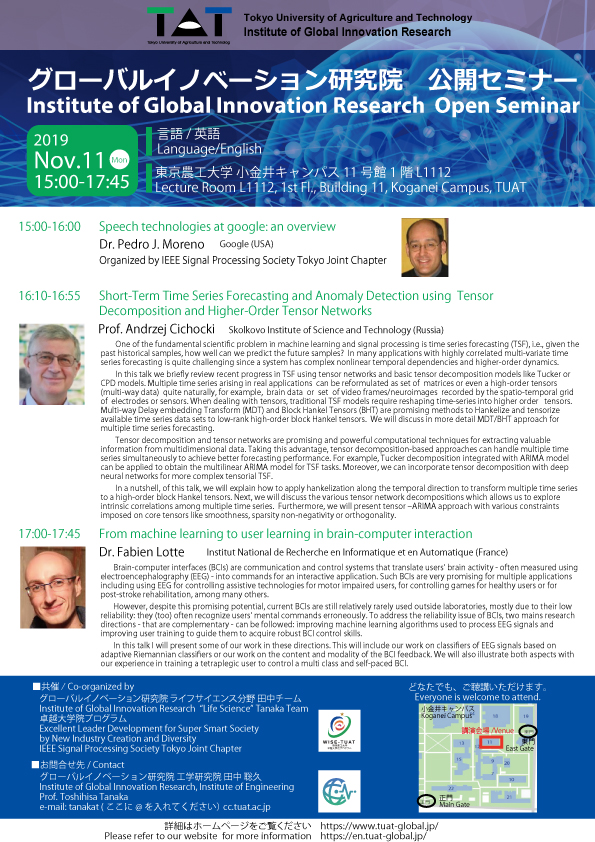イベント情報
【GIR公開セミナー】Dr. Pedro J. Moreno/Prof. Andrzej Cichocki/Dr. Fabien Lotte

| 日時 | 2019.11.11(15:00~17:45) |
|---|---|
| 会場 | |
| 講演タイトル | 15:00-16:00 "Speech technologies at google: an overview" Dr. Pedro J. Moreno (Google, USA) Organized by IEEE Signal Processing Society Tokyo Joint Chapter (https://signalprocessingsociety.org/blog/pedro-j-moreno-google-usa-0) 16:10-16:55 "Short-Term Time Series Forecasting and Anomaly Detection using Tensor Decomposition and Higher-Order Tensor Networks" Prof. Andrzej Cichocki Center for Computational and Data-Intensive Science and Engineering Skolkovo Institute of Science and Technology (Russia) [要旨] One of the fundamental scientific problem in machine learning and signal processing is time series forecasting (TSF), i.e., given the past historical samples, how well can we predict the future samples? In many applications with highly correlated multi-variate time series forecasting is quite challenging since a system has complex nonlinear temporal dependencies and higher-order dynamics. In this talk we briefly review recent progress in TSF using tensor networks and basic tensor decomposition models like Tucker or CPD models. Multiple time series arising in real applications can be reformulated as set of matrices or even a high-order tensors (multi-way data) quite naturally, for example, brain data or set of video frames/neuroimages recorded by the spatio-temporal grid of electrodes or sensors. When dealing with tensors, traditional TSF models require reshaping time-series into higher order tensors. Multi-way Delay embedding Transform (MDT) and Block Hankel Tensors (BHT) are promising methods to Hankelize and tensorize available time series data sets to low-rank high-order block Hankel tensors. We will discuss in more detail MDT/BHT approach for multiple time series forecasting. Tensor decomposition and tensor networks are promising and powerful computational techniques for extracting valuable information from multidimensional data. Taking this advantage, tensor decomposition-based approaches can handle multiple time series simultaneously to achieve better forecasting performance. For example, Tucker decomposition integrated with ARIMA model can be applied to obtain the multilinear ARIMA model for TSF tasks. Moreover, we can incorporate tensor decomposition with deep neural networks for more complex tensorial TSF. In a nutshell, of this talk, we will explain how to apply hankelization along the temporal direction to transform multiple time series to a high-order block Hankel tensors. Next, we will discuss the various tensor network decompositions which allows us to explore intrinsic correlations among multiple time series. Furthermore, we will present tensor –ARIMA approach with various constraints imposed on core tensors like smoothness, sparsity non-negativity or orthogonality. References: Tatsuya Yokota, Hidekata Hontani, Qibin Zhao, and Andrzej Cichocki. "Manifold Modeling in Embedded Space: A Perspective for Interpreting" Deep Image Prior". arXiv preprint arXiv:1908.02995 (2019). Qiquan Shi, Tatsuya Yokota, Andrzej Cichocki et al. "Block Hankel Tensor ARIMA for Multiple Short Time Series Forecasting", (submission AAAI 2020). Tatsuya Yokota, Burak Erem, Seyhmus Guler, Simon K. Warfield, and Hidekata Hontani. "Missing slice recovery for tensors using a low-rank model in embedded space", in Proceedings of the IEEE Conference on Computer Vision and Pattern Recognition, pp. 8251-8259. 2018. 17:00-17:45 "From machine learning to user learning in brain-computer interaction" Dr. Fabien Lotte Institut National de Recherche en Informatique et en Automatique (France) [要旨] Brain-computer interfaces (BCIs) are communication and control systems that translate users' brain activity - often measured using electroencephalography (EEG) - into commands for an interactive application. Such BCIs are very promising for multiple applications including using EEG for controlling assistive technologies for motor impaired users, for controlling games for healthy users or for post-stroke rehabilitation, among many others. However, despite this promising potential, current BCIs are still relatively rarely used outside laboratories, mostly due to their low reliability: they (too) often recognize users' mental commands erroneously. To address the reliability issue of BCIs, two mains research directions - that are complementary - can be followed: improving machine learning algorithms used to process EEG signals and improving user training to guide them to acquire robust BCI control skills. In this talk I will present some of our work in these directions. This will include our work on classifiers of EEG signals based on adaptive Riemannian classifiers or our work on the content and modality of the BCI feedback. We will also illustrate both aspects with our experience in training a tetraplegic user to control a multi class and self-paced BCI. |
| 言語 | 英語 |
| 対象 | どなたでも、ご聴講いただけます。 |
| 共催 | グローバルイノベーション研究院 ライフサイエンス分野 田中チーム 卓越大学院プログラム IEEE Signal Processing Society Tokyo Joint Chapter |
| 開催概要 | |
| お問い合わせ窓口 | グローバルイノベーション研究院 工学研究院 田中 聡久 e-mail: tanakat (ここに@ を入れてください) cc.tuat.ac.jp |
このページの上部へ